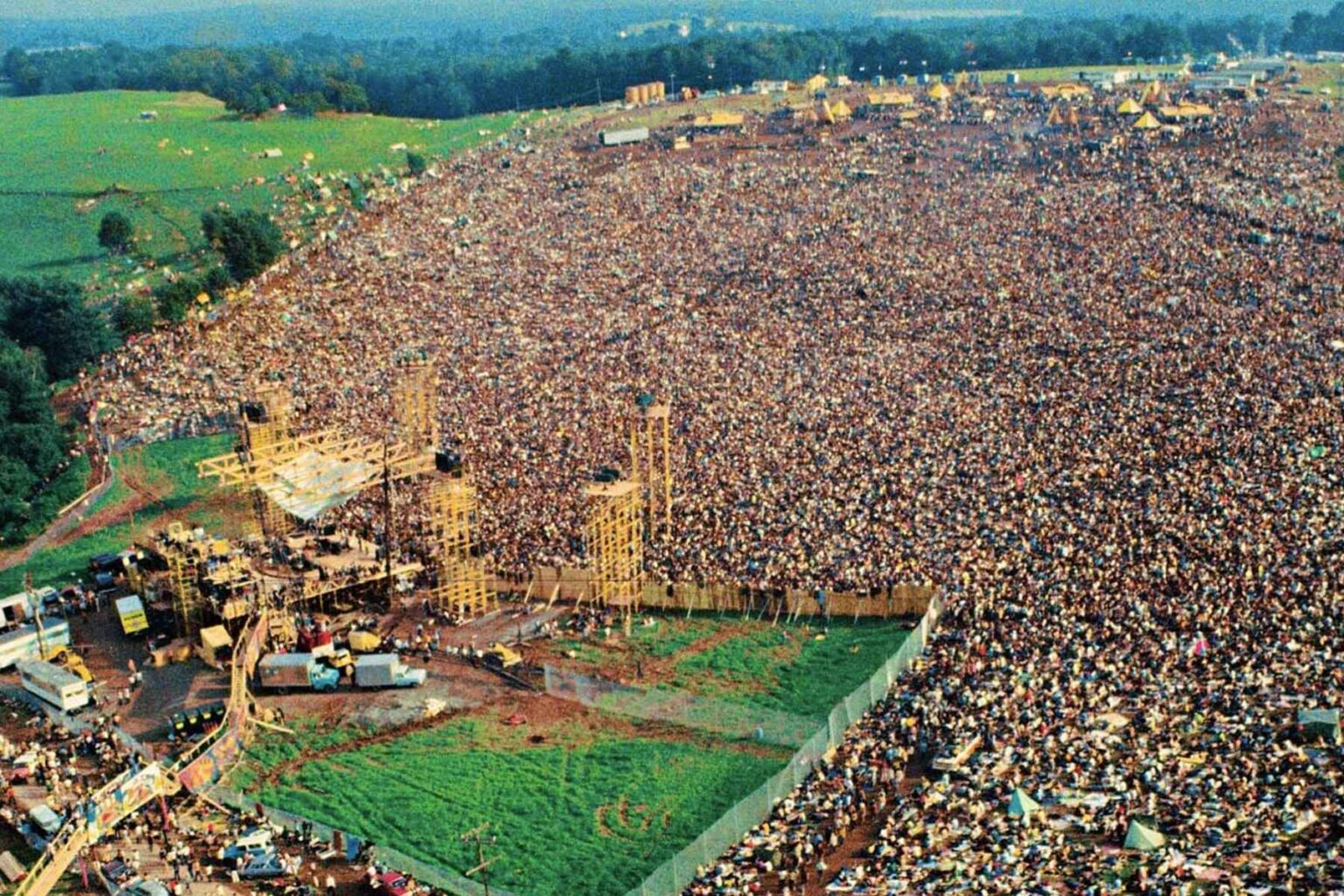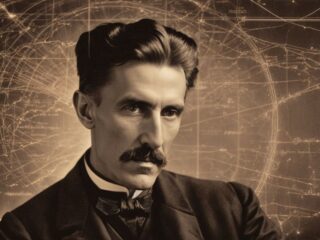Music has the power to create moments that are unforgettable. From Woodstock in 1969 to Michael Jackson’s Thriller Tour, these concerts have made a lasting impact. They have changed music history and touched the hearts of fans everywhere. Let’s look at seven legendary concerts that changed the music world forever.
Key Takeaways
- Legendary live music events have shaped the course of music history and culture.
- These iconic concerts have showcased the raw power and versatility of artists, captivating audiences across generations.
- From surprise rooftop performances to rain-soaked triumphs, these concerts have become defining moments in music.
- The ability of live music to unite people and transcend the ordinary is a testament to its enduring impact.
- The article explores seven legendary concerts that have left an indelible mark on the music industry.
Woodstock Music Festival, 1969
The Woodstock Music Festival took place from August 15-18, 1969, in Bethel, New York. It was more than a concert; it was a key moment in music history. Over 400,000 people came together, celebrating peace, love, and music.
This event showcased legendary artists and became a symbol of the 1960s counterculture. Woodstock set the standard for future music festivals and had a lasting impact on the industry.
Legendary musicians like Jimi Hendrix, Creedence Clearwater Revival (CCR), Carlos Santana, Joan Baez, and Sweetwater performed. Santana’s performance of “Soul Sacrifice” was a highlight, with drummer Michael Shrieve, just 20 at the time, making a remarkable contribution.
One of the most memorable moments was Jimi Hendrix’s version of “The Star-Spangled Banner.” It was meant for Sunday night but happened on Monday morning. Hendrix’s performance was a powerful statement, reflecting the era’s social and political turmoil.
Joe Cocker’s soulful rendition of The Beatles’ “With a Little Help from My Friends” also stood out. It received a standing ovation, making Woodstock a true musical milestone.
The Woodstock Music Festival showed the power of music to unite and inspire. Its legacy continues to influence music festivals, artists, and audiences worldwide. It remains one of the most iconic venues and unforgettable musical milestones in history.
The Beatles at Shea Stadium, 1965
The Beatles’ concert at Shea Stadium in 1965 was a historic moment in music. It showed the band’s incredible performances and highlights. This was the first big stadium show in rock history, with 55,600 fans attending.
The event showed how popular The Beatles were. They amazed the huge crowd with their charm and skill. Despite the technical issues of the time, their show proved their lasting appeal and status as icons.
Music stars like Mick Jagger and Keith Richards were there, amazed by the Beatlemania in America. The concert’s impact was so big that it was turned into a documentary. “The Beatles at Shea Stadium” aired on BBC1 in 1966, letting fans worldwide relive that magical night.
The Beatles’ Shea Stadium concert raised the bar for live music. It opened the door for future big rock shows. It also solidified the band’s place as one of the most influential and legendary in music history.
Bob Dylan Goes Electric, 1965
Bob Dylan’s change at the 1965 Newport Folk Festival is a big moment in music history. On July 25th, he shocked everyone by “going electric.” This change marked a big shift in his music and in popular music too.
At the festival, 17,000 people watched Dylan play with an electric guitar. Some fans cheered, while others were upset. Later, during a British tour, someone yelled “Judas!” at one of his shows. This event sparked a lot of debate and changed music forever.
Dylan decided to play with a band for his final performance in 1965. Al Kooper played piano and organ, adding a new sound to Dylan’s music. Songs like “Maggie’s Farm” and “Like A Rolling Stone” showed a new side of Dylan’s music.
The crowd’s reaction at the festival showed how powerful Dylan’s music was. Some cheered, while others booed. But the impact of that day has lasted for many years.
Queen at Live Aid, 1985
In 1985, the world watched as Queen took the stage at Live Aid. Their 20-minute set was unforgettable. It showed their unmatched ability to connect with fans through their music.
Freddie Mercury, the band’s legendary frontman, dazzled with his incredible voice and stage presence. His performance of “Bohemian Rhapsody” at Wembley Stadium is still talked about today. It’s known as “the note heard around the world,” making Queen a rock legend.
Queen’s performance was perfectly timed for the UK audience. They played after the broadcast went global. Their setlist, featuring hits like “Radio Ga Ga” and “We Will Rock You,” amazed everyone.
Queen’s Live Aid performance was a turning point in their career. It led to their album “A Kind Of Magic” and a world tour. This solidified their place in live music history.
The Rolling Stones in Hyde Park, 1969
The Rolling Stones’ concert in Hyde Park, London, on July 5, 1969, is a landmark gig in rock history. It drew between 250,000 and 500,000 fans. This free outdoor festival was a big moment, marking the debut of new guitarist Mick Taylor after Brian Jones’ passing.
Fans gathered at the park with candles on July 4th to honor Brian Jones. The Stones gave a powerful and emotional performance. They played hits like “Honky Tonk Women” and a 18-minute version of “Sympathy for the Devil,” with African tribal drummers adding a unique touch.
This was the Stones’ first public show in over two years. It was filmed by Granada Television and aired in September of the same year. The concert at this iconic venue solidified the Rolling Stones’ legendary status in rock music.
Nirvana at Reading Festival, 1992
Nirvana’s show at the Reading Festival on August 30, 1992, is a highlight in the festival’s history. Over 50,000 people saw Kurt Cobain’s raw energy. Nirvana’s grunge set spoke to a whole generation’s angst and authenticity.
This tour and performance made Nirvana a rock legend. The Live at Reading album, released in 2009, captured the grunge spirit. It showed why Nirvana became a cultural icon.
Nirvana’s 1992 Reading Festival set showed their talent and stage presence. Despite internal tensions, including Kurt Cobain’s heroin use, they delivered a memorable show. The event was unique, with Cobain’s wheelchair entrance and a clown invader.
The show, one of Nirvana’s last big UK performances, had hits like “Breed” and “Smells Like Teen Spirit.” They even played covers by Fang and The Wipers. This showed Nirvana’s wide musical range.
Michael Jackson’s Thriller Concert, 1984
The 1980s were a time of big change in music. Michael Jackson’s Thriller Tour was a highlight of the decade. It started in 1984 and showed the world what a concert could be.
The tour lasted a year and visited 120 places across the globe. Fans saw amazing dance moves, top-notch sound, and Jackson’s incredible energy. It raised the bar for live music and made Jackson the King of Pop.
Places like Wembley Stadium and Madison Square Garden hosted these shows. They were filled with songs from the Thriller album. New Edition opened, making everyone even more excited for Jackson’s performances.
The Thriller Tour was more than just one show. It changed the music world forever. Jackson’s hard work, charisma, and the huge production set a new standard. It still inspires artists and fans today, making it a legendary concert experience.
Wrapping up
The seven legendary concerts we’ve looked at are key moments in music history. They’ve left a lasting impact on the music world and culture. From Woodstock’s countercultural shift to Michael Jackson’s pop performance redefinition, these shows show live music’s power.
These iconic performances show music’s power to capture an era’s spirit, challenge norms, and create lasting experiences. Reflecting on these musical milestones, we see their lasting effect on music’s evolution and cultural impact.
The legacy of these legendary concerts still inspires artists, audiences, and the music industry. They remind us of music’s unmatched ability to move and captivate us, leaving a mark on our collective memory.




